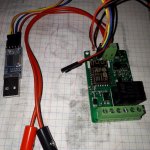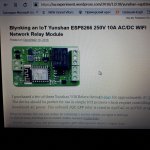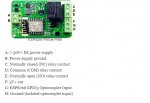#include <ESP8266WiFi.h>
// Esp8266 pinouts
#define ESP8266_GPIO2 2 // Blue LED.
#define ESP8266_GPIO4 4 // Relay control.
#define ESP8266_GPIO5 5 // Optocoupler input.
#define LED_PIN ESP8266_GPIO2
// WiFi Definitions.
const char ssid[] = "11111111";
const char pswd[] = "1111111";
WiFiServer server( 80 );
volatile int relayState = 0; // Relay state.
void setup() {
initHardware();
connectWiFi();
server.begin();
}
void GetClient( WiFiClient client ) {
// Read the first line of the request.
String req = client.readStringUntil( '\r' );
Serial.println( req );
client.flush();
String s = "HTTP/1.1 200 OK\r\nContent-Type: text/html\r\n\r\n<!DOCTYPE HTML>\r\n<html>\r\n";
if ( req.indexOf( "OPTIONS" ) != -1 ) {
s += "Allows: GET, OPTIONS";
} else if ( req.indexOf( "GET" ) != -1 ) {
if ( req.indexOf( "open" ) != -1 ) {
// relay on!
s += "relay on!";
relayState = 1;
digitalWrite( ESP8266_GPIO4, 1 ); // Relay control pin.
} else if ( req.indexOf( "close" ) != -1 ) {
// relay off!
s += "relay off!";
relayState = 0;
digitalWrite( ESP8266_GPIO4, 0 ); // Relay control pin.
} else if ( req.indexOf( "relay" ) != -1 ) {
if ( relayState == 0 )
// relay off!
s += "relay off!";
else
// relay on!
s += "relay on!";
} else if ( req.indexOf( "io" ) != -1 ) {
if ( digitalRead( ESP8266_GPIO5 ) == 0 )
s += "input io is:0!";
else
s += "input io is:1!";
} else if ( req.indexOf( "MAC" ) != -1 ) {
uint8_t mac[WL_MAC_ADDR_LENGTH];
WiFi.softAPmacAddress( mac );
String macID = String( mac[WL_MAC_ADDR_LENGTH - 5], HEX) + String( mac[WL_MAC_ADDR_LENGTH - 4], HEX) +
String( mac[WL_MAC_ADDR_LENGTH - 3], HEX) + String( mac[WL_MAC_ADDR_LENGTH - 2], HEX) +
String( mac[WL_MAC_ADDR_LENGTH - 1], HEX) + String( mac[WL_MAC_ADDR_LENGTH], HEX);
macID.toUpperCase();
s += "MAC address: " + macID;
} else
s += "Invalid Request.<br> Try: open/close/relay/io/MAC";
} else
s = "HTTP/1.1 501 Not Implemented\r\nContent-Type: text/html\r\n\r\n<!DOCTYPE HTML>\r\n<html>\r\n";
client.flush();
s += "</html>\n";
// Send the response to the client.
client.print( s );
delay( 1 );
Serial.println( "Client response sent." );
}
void loop() {
// Check if a client has connected.
WiFiClient client = server.available();
if ( client )
GetClient( client );
}
void connectWiFi() {
byte ledStatus = LOW;
Serial.println();
Serial.println( "Connecting to: " + String( ssid ) );
// Set WiFi mode to station (as opposed to AP or AP_STA).
WiFi.mode( WIFI_STA );
// WiFI.begin([ssid], [passkey]) initiates a WiFI connection.
// to the stated [ssid], using the [passkey] as a WPA, WPA2, or WEP passphrase.
WiFi.begin( ssid, pswd );
while ( WiFi.status() != WL_CONNECTED ) {
// Blink the LED.
digitalWrite( LED_PIN, ledStatus ); // Write LED high/low.
ledStatus = ( ledStatus == HIGH ) ? LOW : HIGH;
delay( 100 );
}
Serial.println( "WiFi connected" );
Serial.println( "IP address: " );
Serial.println( WiFi.localIP() );
}
void initHardware() {
Serial.begin( 9600 );
pinMode( ESP8266_GPIO4, OUTPUT ); // Relay control pin.
pinMode( ESP8266_GPIO5, INPUT_PULLUP ); // Input pin.
pinMode( LED_PIN, OUTPUT ); // ESP8266 module blue LED.
digitalWrite( ESP8266_GPIO4, 0 ); // Set relay control pin low.
}




